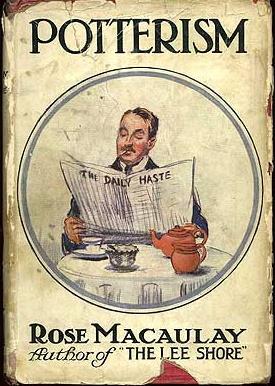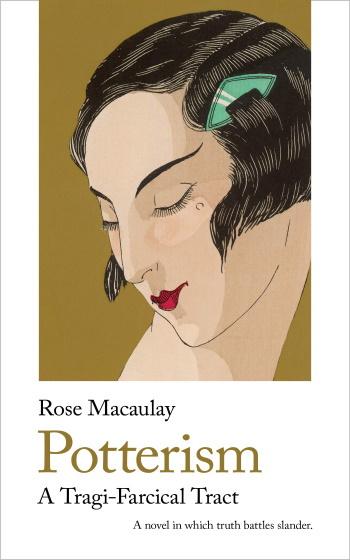Book review by George Simmers: In this novel, Rose Macaulay gives her diagnosis of what is wrong with Britain after the end of the First World War. She sums this up in one word: 'Potterism'. Which means sentimentality, materialism, mental laziness, and the avoidance of awkward truths.
 Cover of the first edition.
Cover of the first edition.
Mr Potter is a press baron; 'a small, bird-like person of no presence' he has considerable intelligence and no principles. He has grown rich because he gives the public exactly what it wants. So, in her different way, does his wife, Mrs Potter, who writes cosily middlebrow novels under the pen-name of 'Leila Yorke'.
They were pleasant to many, readable by more, and quite unmarred by any spark of cleverness, flash of wit, or morbid taint of philosophy.
Mr Potter, of course, has done well out of the war.
The Potter press surpassed itself [...] with energy and whole-heartedness, it cheered, comforted and stimulated the people. It never failed to say how well the Allies were getting on, how much ammunition they had, how many men, what indomitable tenacity and cheerful spirits enlivened the trenches. [....] In times of darkness and travail one cannot but be glad of such a press as this. So glad were the government of it that Mr Potter became, at the end of 1916, Lord Pinkerton, and his press the Pinkerton press.
His two liveliest children, Jane and Johnny Potter, rebel against the family norms, and with their friends from Oxford conspire in an informal society of Anti-Potterites - yet the novel will go on to show that these two themselves are not immune to Potterism - but then hardly anyone is - it's the English disease..
But there are two exceptions, Katherine Varick, who is a scientist, and Arthur Gideon, a writer and journalist committed to truth - to the facts. He and another (not quite so uncompromising) young man set up a magazine called Fact, dedicated to treating all issues objectively, without bias of any kind. He tries to live up to his principles; His father, years earlier, had changed his surname to disguise his Jewish heritage; Arthur, though only half-Jewish, resumes the name Gideon on principle. He is the one that realises that Jane, for all their anti-Potterism, is till a Potter at heart, though he cannot help loving her. (This is a typical Macaulay theme, the intellect and the heart being at cross-purposes.)
Gideon narrates one part of the book, and is the voice for much of Macaulay's best satire; he is scathing about wartime pieties, for example:
What one specially resented was the way the men who had been killed, poor devils, were exploited by the makers of speeches and writers of articles. First, they'd perhaps be called "the fallen" instead of "the killed" (it's a queer thing how "fallen" in the masculine means killed in the war, and in the feminine given over to a particular kind of vice), and then the audience, or the readers, would be told that they died for democracy, or a cleaner world, when they very likely many of them hated the first and never gave an hour's thought to the second.
Gideon is equally critical of the pieties of the conventionally 'anti-war' poets:
Everyone knows that school of poetry by heart now; of course it was particularly fashionable just after the war. [....] Anyone can do it. One takes some dirty, horrible incident or sight of the battle-front and describes it in loathesome detail, and then, by way of contrast, describes some fat and incredibly bloodthirsty woman or middle-aged clubman at home, gloating over the glorious war. I always thought it a great bore, and sentimental at that. But it was the thing for a time, and people seemed to be impressed by it, and Peacock, who encouraged young men, often to their detriment, would take it for the Fact, though that sort of cheap and popular appeal to sentiment was the last thing the Fact was out for.
The opposing forces are set up in the first half of the novel, but then a violent death occurs, and the book for a while becomes a whodunit that is more involving than most whodunits. This episode tests all the characters, bringing out their true nature. (The ridiculous Lady Potter, for example, heads off to see a spiritualist who will tell her exactly what she wants to hear. And in her, and in almost everyone else, the event exposes the Anti-Semitism that had previously been kept under the surface.) After the mystery is solved, nothing is quite the same, but the characters go their ways, with most of the Anti-Potterites settling nicely down to worldly success. Only Gideon sticks to his anti-doctrinaire creed, giving up writing and going off to find out facts. It does not end well for him.
This is Macaulay in her best satirical vein. Others of her novels may go deeper into characters - Told by an Idiot and The World My Wilderness, for example, but Potterism, I think, is the novel that most generously offers the reader the exhilaration of joining with her highly intelligent mind as it ruthlessly surveys the world and brilliantly skewers things that need to be skewered.
The excellent news is that Handheld Press have recently printed a reissue of it.

